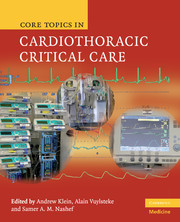Book contents
- Frontmatter
- Contents
- Contributors
- Preface
- Foreword
- Abbreviations
- SECTION 1 Admission to Critical Care
- SECTION 2 General Considerations in Cardiothoracic Critical Care
- SECTION 3 System Management in Cardiothoracic Critical Care
- 3.1 CARDIOVASCULAR SYSTEM IN CARDIOTHORACIC CRITICAL CARE
- 3.2 RESPIRATORY SYSTEM IN CARDIOTHORACIC CRITICAL CARE
- 3.3 RENAL SYSTEM IN CARDIOTHORACIC CRITICAL CARE
- 3.4 HAEMATOLGY AND TRANSFUSION IN CARDIOTHORACIC CRITICAL CARE
- 3.5 GASTROINTESTINAL SYSTEM IN CARDIOTHORACIC CRITICAL CARE
- 3.6 IMMUNE SYSTEM AND INFECTION IN CARDIOTHORACIC CRITICAL CARE
- 3.7 ENDOCRINE SYSTEM IN CARDIOTHORACIC CRITICAL CARE
- 3.8 NEUROLOGICAL SYSTEM IN CARDIOTHORACIC CRITICAL CARE
- 44 Sedation and analgesia
- 45 Neurological complications
- 46 Psychiatric illness during and after discharge from critical care
- SECTION 4 Procedure-Specific Care in Cardiothoracic Critical Care
- SECTION 5 Discharge and Follow-up From Cardiothoracic Critical Care
- SECTION 6 Structure and Organisation in Cardiothoracic Critical Care
- SECTION 7 Ethics, Legal Issues and Research in Cardiothoracic Critical Care
- Appendix Works Cited
- Index
46 - Psychiatric illness during and after discharge from critical care
from 3.8 - NEUROLOGICAL SYSTEM IN CARDIOTHORACIC CRITICAL CARE
Published online by Cambridge University Press: 05 July 2014
- Frontmatter
- Contents
- Contributors
- Preface
- Foreword
- Abbreviations
- SECTION 1 Admission to Critical Care
- SECTION 2 General Considerations in Cardiothoracic Critical Care
- SECTION 3 System Management in Cardiothoracic Critical Care
- 3.1 CARDIOVASCULAR SYSTEM IN CARDIOTHORACIC CRITICAL CARE
- 3.2 RESPIRATORY SYSTEM IN CARDIOTHORACIC CRITICAL CARE
- 3.3 RENAL SYSTEM IN CARDIOTHORACIC CRITICAL CARE
- 3.4 HAEMATOLGY AND TRANSFUSION IN CARDIOTHORACIC CRITICAL CARE
- 3.5 GASTROINTESTINAL SYSTEM IN CARDIOTHORACIC CRITICAL CARE
- 3.6 IMMUNE SYSTEM AND INFECTION IN CARDIOTHORACIC CRITICAL CARE
- 3.7 ENDOCRINE SYSTEM IN CARDIOTHORACIC CRITICAL CARE
- 3.8 NEUROLOGICAL SYSTEM IN CARDIOTHORACIC CRITICAL CARE
- 44 Sedation and analgesia
- 45 Neurological complications
- 46 Psychiatric illness during and after discharge from critical care
- SECTION 4 Procedure-Specific Care in Cardiothoracic Critical Care
- SECTION 5 Discharge and Follow-up From Cardiothoracic Critical Care
- SECTION 6 Structure and Organisation in Cardiothoracic Critical Care
- SECTION 7 Ethics, Legal Issues and Research in Cardiothoracic Critical Care
- Appendix Works Cited
- Index
Summary
Introduction
The physical consequences of critical illness are relatively easily recognized by clinicians, families and patients. Less apparent are psychological symptoms that appear during critical illness and afterwards and that can combine to create symptom clusters of sufficient severity that a specific psychiatric disorder results. Recognizing the psychological symptoms that are expected after major illness and knowing the usual severity and duration of symptoms is an important skill for clinicians caring for patients during and after critical care. Almost all psychiatric research on the epidemiology and treatment of depression, anxiety or post-traumatic stress disorder (PTSD) has been conducted with patients not in critical care units, so that translating research from ambulatory patients with little medical comorbidity to critically ill patients is difficult.
No clinical recommendations can be made that are supported by multiple trials performed in critical care patients.
Defining psychiatric illness
Psychiatrists in Europe and the United States generally use categorical schema to define disorders based on counting symptoms and behaviours, although there is substantial evidence that psychiatric symptoms and conditions occur on a continuum.
For instance, by DSM-IV criteria, the basis for defining depression-related mood disorders is the presence of a Major Depressive Episode (MDE), which requires 2 weeks or more of either daily depressed mood or anhedonia (inability to gain pleasure from enjoyable experiences). In addition, four other concurrent somatic or psychological cardinal symptoms should be present, such as low energy, feeling of worthlessness, suicidal ideation, anorexia or psychomotor agitation or retardation.
- Type
- Chapter
- Information
- Core Topics in Cardiothoracic Critical Care , pp. 362 - 368Publisher: Cambridge University PressPrint publication year: 2008

